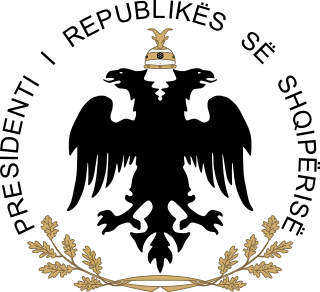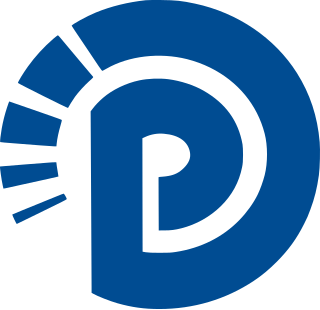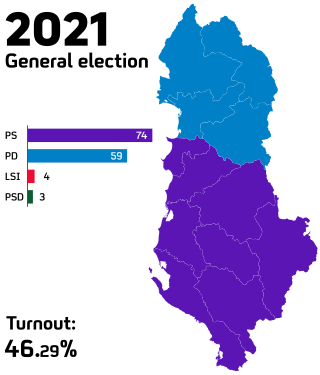| ||
The Albanian local elections in 1996 was the second local election held in Albania. The elections were held on 20 and 27 October 1996 and the winner was the Democratic Party of Albania. [1]
| ||
The Albanian local elections in 1996 was the second local election held in Albania. The elections were held on 20 and 27 October 1996 and the winner was the Democratic Party of Albania. [1]
| Party name | Result [1] | Mayors | Head of Commune |
|---|---|---|---|
| Democratic Party of Albania | 52,5% | 58 | 267 |
| Socialist Party of Albania | 31,2% | 4 | 15 |
| Republican Party of Albania | 3,5% | — | — |
| Social Democratic Party + Democratic Alliance Party | 3,1% | — | — |
| Balli Kombëtar | 2,4% | 0 | 1 |
| Unity for Human Rights Party | 2,3% | 0 | 9 |
| Union of Social Democrats | 1,0% | — | — |
| Other Parties | 4,0% | 1 | 5 |

Politics in North Macedonia occur within the framework of a parliamentary representative democratic republic, whereby the Prime Minister is the head of government, and of a multi-party system. Executive power is exercised by the government. Legislative power is vested in both the government and parliament. The Judiciary is independent of the executive and the legislature. The Economist Intelligence Unit rated North Macedonia a "flawed democracy" in 2022.
Albania is a unitary parliamentary constitutional republic, where the President of Albania is the head of state and the Prime Minister of Albania the head of government in a multi-party system. The executive power is exercised by the Government and the Prime Minister with its Cabinet. Legislative power is vested in the Parliament of Albania. The judiciary is independent of the executive and the legislature. The political system of Albania is laid out in the 1998 constitution. The Parliament adopted the current constitution on 28 November 1998. Historically Albania has had many constitutions. Initially constituted as a monarchy in 1913, Albania became briefly a republic in 1925, and then a democratic monarchy in 1928. In 1939 Albania was invaded by Fascist Italian forces, imposing a puppet state, and later occupied by Nazi German forces. Following the partisan liberation from the Nazis in 1944 a provisional government was formed, which by 1946 had transformed into a Communist one party state. In March 1991 democracy was restored with multi-party elections.

Sali Ram Berisha is an Albanian conservative politician and former cardiologist who served as the second President of Albania from 1992 to 1997 and Prime Minister from 2005 to 2013.

The president of Albania, officially styled the President of the Republic of Albania, is the head of state, commander-in-chief of the military and the representative of the unity of the Albanian people.

Fatos Thanas Nano is an Albanian socialist politician who served as Prime Minister of Albania in 1991, from 1997 to 1998 and from 2002 to 2005. He was the first leader and founder of the Socialist Party of Albania and a member of the Albanian Parliament from 1991 to 1993 and 1997 to 2009. He reformed the anti-revisionist Marxist-Leninist ideology of the Labor Party of Albania into social democracy for its successor, the Socialist Party. During his leadership, the Socialist Party, as a result of reforms, joined the Socialist International and Party of European Socialists. Nano was a candidate in the 2007 presidential election but did not win. He again tried in the 2012 presidential election, but he did not even qualify as a candidate, because the leaders of parties in Parliament obstructed their respective MPs to elect him as candidate in the elections.

The Democratic Party of Albania is a conservative political party in Albania. It has been the largest opposition party in the country since 2013.

The Republican Party of Albania is a national-conservative political party in Albania. It currently holds 3 of the 140 seats in the Parliament of Albania, in alliance with the Democratic Party of Albania.

The Unity for Human Rights Party is a social-liberal political party in Albania supporting the Greek minority. Founded in 1992, it represents Albania's minorities and is mainly related to the Greek minority, and is the political continuation of Omonoia. It works with Omonoia, MEGA and other Greek parties in Albania at national elections, under a Greek bloc. The party is currently led by Vangjel Dule, who holds the party's only seat in Parliament.

The Demochristian Party of Albania is a small Christian democratic political party in Albania.

Ilir Rexhep Meta is an Albanian politician. He served as President of Albania from 24 July 2017 to 24 July 2022.
This electoral calendar 2007 lists the national/federal direct elections held in 2007 in the de jure and de facto sovereign states and their dependent territories. Referendums are included, although they are not elections. By-elections are not included.

The Albanian Civil War in 1997 was sparked by pyramid scheme failures in Albania soon after its transition to a market economy. The government was toppled and more than 2,000 people were killed. Various other sources also describe the violence that ensued as a rebellion, or a rebellion that gradually escalated into a civil war.
New Democratic Force is a political party of the Albanian minority in Montenegro.

Lulzim Basha is an Albanian politician who served as the chairman of the Democratic Party of Albania, the main opposition party, from 2013 to March 21, 2022 when he stepped down from the leadership of the party.
The fall of Communism in Albania, the last such event in Europe outside the Soviet Union, started in December 1990 with student demonstrations in the capital, Tirana, although protests started in January that year in other cities like Shkodra and Kavaja. The Central Committee of the communist Party of Labour of Albania allowed political pluralism on 11 December and the largest opposition party, the Democratic Party, was founded the next day. March 1991 elections left the Party of Labour in power, but a general strike and urban opposition led to the formation of a "stability government" that included non-communists. Albania's former communists were routed in elections in March 1992 amid economic collapse and social unrest, with the Democratic Party winning most seats and its party head, Sali Berisha, becoming president.
In 1991, the Socialist Party of Albania, with specific social democratic ideology took control of the country through democratic elections. One year later the Democratic Party of Albania won the new elections. After 1990, Albania has been seeking a closer relationship with the West. What followed were deliberate programs of economic and democratic reform, but the implementation of capitalism led to the proliferation of pyramid schemes – which were not banned due to the corruption of the government. Chaos in late 1996 to early 1997, as a result of the collapse of these pyramid schemes, alarmed the world and prompted the influx of international peacekeeping forces. In 1995, Albania was accepted into the Council of Europe and requested membership in NATO and is a potential candidate country for accession to the European Union. The workforce of Albania has continued to emigrate to Western countries, especially Greece and Italy.
Local elections were held in Serbia over two rounds on 3 November and 17 November 1996, concurrently with the 1996 Vojvodina provincial election; the first day of voting also coincided with the 1996 Yugoslavian parliamentary election and the 1996 Montenegrin parliamentary election. This was the third local electoral cycle held while Serbia was a member of the Federal Republic of Yugoslavia and the last time that Serbia oversaw local elections throughout Kosovo and Metohija until its parallel elections in 2008.

The Albanian local elections of 2011 took place on 8 May 2011 in Albania. Electors were asked to elect their municipality's mayor, municipal council members, municipal unit mayor, and municipal unit members. The elections were administrated by the Central Election Commission of Albania. Only 9 of the 384 winning candidates were women.

Early parliamentary elections were held in North Macedonia on 15 July 2020. It was originally scheduled for November 2020, but Prime Minister Zoran Zaev called early elections after the European Council failed to come to an agreement on starting talks with North Macedonia on joining the European Union in October 2019. The election date was set for 12 April, but was postponed until July due to the COVID-19 pandemic in North Macedonia.

Parliamentary elections were held in Albania on 25 April 2021. It took place during the COVID-19 pandemic.